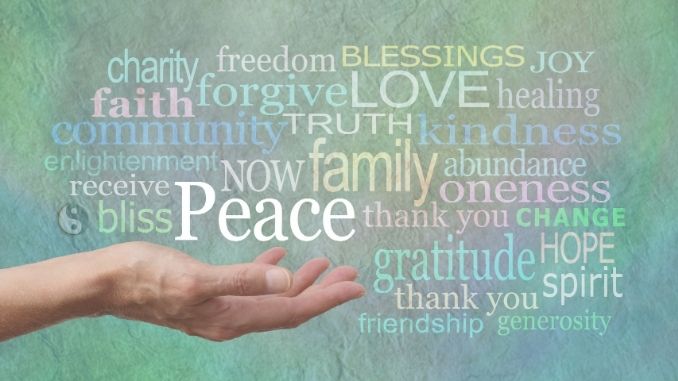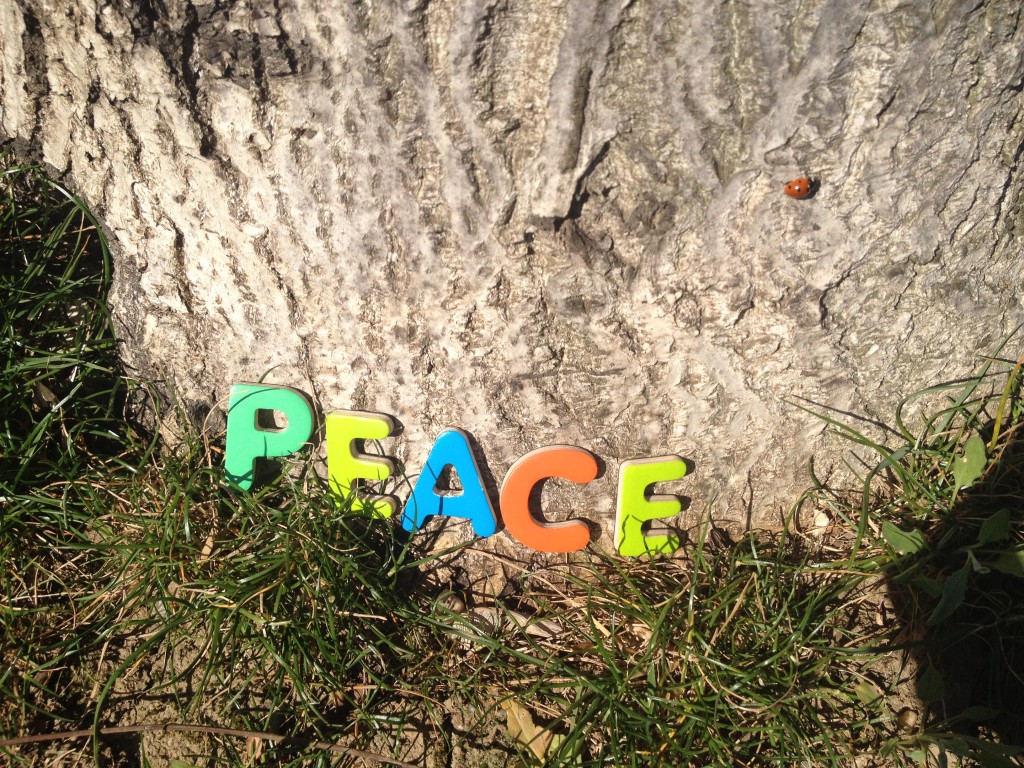Delve into the essence of ‘peace’ with our detailed dictionary guide. Discover the full definition, explore its profound meanings, find synonymous terms that capture similar sentiments, and learn about its antonyms. This resource is perfect for students, writers, and anyone interested in the nuanced understanding of this significant word. Enhance your knowledge and vocabulary with our comprehensive exploration of ‘peace.’ The word “peace” is related to the absence of war or other hostilities, an agreement or a treaty to end hostilities, freedom from quarrels and disagreement, harmonious relations, inner contentment, SERENITY, used as a request for silence, in a state of tranquility, serene, free from strife, be silent, a state of harmony between people or groups, absence of mental anxiety (often in the phrase peace of mind), a state of STILLNESS, SILENCE.
PEACE definition – Full meaning of PEACE
At peace is to become reconciled with, to feel freedom from anxiety, annoyance, or other mental disturbance, untroubled, tranquil, to prevent discord, absence of fighting or quarreling, peaceful, calm, to lay down arms, to cease fighting, to make peace, a sign of good faith, favors negotiation and compromise as a means of resolving differences, a time of peace and prosperity, golden days, to indicate one’s peaceful intentions, cordiality, HARMONY.

Peace of mind is to feel ataraxis, peacefulness, repose, serenity, heartsease, quietude, quietness, tranquility, public security, security, pacification, live in harmony, live in accord, a pleasing combination of elements in a whole, a combination of sounds considered pleasing to the ear. Ataraxis is the absence of mental stress or anxiety. Heartsease is peace of mind and a state of peace and quiet.
PEACE related words
Peace is related to awesome positive words like agreement, accord, harmonious relations, congruity, compatibility, harmonization, consonance, unity, sympathy, cooperation, goodwill, amicability, like-mindedness, unison, tunefulness, euphony, melodiousness, balance, consistency, coordination. Like-mindedness is the same turn of mind, having a similar or identical opinion, disposition, like, similar. Access the list of positive words to brighten your day!

Synonyms of PEACE:
- Harmony
- Tranquility
- Serenity
- Calmness
- Quiet
- Stillness
- Restfulness
- Amity
- Concord
- Nonviolence
Antonyms of PEACE:
- Conflict
- War
- Discord
- Turmoil
- Agitation
- Unrest
- Strife
- Violence
- Chaos
- Disturbance
Peace is more than just the absence of war or conflict; it’s a profound and multifaceted concept that resonates deeply in the human experience. At its core, peace is about harmony and tranquility, not just on a global scale, but also within societies, communities, and individuals.
In a broader sense, peace refers to a state where nations and communities interact with respect, cooperation, and understanding, free from the fear of violence. It’s a world where justice prevails, conflicts are resolved through dialogue, and everyone’s rights are respected. This kind of peace is often what we strive for in international relations and political discourses.
On a personal level, peace embodies serenity, a calm state of mind where stress and discord are minimal. It’s about finding inner balance, being in tune with oneself and others, and fostering a sense of contentment and well-being. This personal peace is crucial for mental health and overall happiness.
Moreover, peace extends to our interactions with others. It’s about building relationships based on mutual respect, empathy, and understanding. In a peaceful society, diversity is celebrated, and conflicts are addressed constructively, without resorting to aggression or coercion.
However, achieving and maintaining peace is a continuous process. It requires effort, patience, and often, a shift in attitudes and perspectives. It involves actively promoting dialogue, understanding, tolerance, and compassion. Education, open communication, and cultural exchange are vital tools in this endeavor.
In literature and art, peace has been a central theme, often depicted as an ideal state of existence, a utopia that humanity continually aspires to achieve. Philosophers, leaders, and visionaries have pondered over it, offering various interpretations and paths to attain it.
Ultimately, peace is an essential element of a thriving and sustainable future. It’s a universal goal that transcends cultures and generations, a beacon of hope and a guiding principle for a better world.”
This text explores the concept of peace from various angles, offering insights into its importance and the ways in which it manifests in different aspects of life.
Here is a list of 10 notable books that explore the theme of peace in various contexts:
- “Peace Is Every Step: The Path of Mindfulness in Everyday Life” by Thich Nhat Hanh – This book by the renowned Buddhist monk and peace activist Thich Nhat Hanh offers insights into finding peace through mindfulness and living in the present moment.
- “The Art of Peace” by Morihei Ueshiba – Written by the founder of Aikido, this book presents a philosophical perspective on achieving peace through martial arts, focusing on harmony and the resolution of conflict.
- “The Anatomy of Peace: Resolving the Heart of Conflict” by The Arbinger Institute – This book delves into how our inner conflicts often manifest in our external world, offering strategies for achieving peace through understanding and compassion.
- “Nonviolent Communication: A Language of Life” by Marshall B. Rosenberg – Rosenberg’s book is a guide to compassionate communication and resolving conflicts peacefully, emphasizing empathy and understanding in interactions.
- “A Long Walk to Freedom” by Nelson Mandela – Nelson Mandela’s autobiography is not only the story of his life but also a testament to his long struggle for peace and equality in South Africa.
- “Peaceful Revolution: How We Can Create the Future Needed for Humanity’s Survival” by Paul K. Chappell – An exploration of peace in the context of global challenges, this book looks at peace as a practical and necessary approach for human survival.
- “Creating True Peace: Ending Violence in Yourself, Your Family, Your Community, and the World” by Thich Nhat Hanh – Another profound work by Thich Nhat Hanh, focusing on overcoming the origins of violence and conflict.
- “War and Peace” by Leo Tolstoy – A classic in literature, Tolstoy’s epic novel explores the impact of war on society and individuals, as well as the philosophical quest for personal peace.
- “Cultivating Peace: Becoming a 21st-Century Peace Ambassador” by James O’Dea – This book provides a comprehensive approach to becoming an effective peace ambassador in today’s world.
- “The Moral Imagination: The Art and Soul of Building Peace” by John Paul Lederach – Lederach offers a compelling argument for using creativity and imagination in resolving conflicts and building lasting peace.
These books cover a range of perspectives on peace, from personal inner peace to global peace efforts, offering valuable insights into one of humanity’s most enduring and challenging goals.
Inspiring Content Related to PEACE
- Is Inner Peace So Difficult to Achieve?
- Illumination ~ Peaceful Gregorian Chants
- Power of Positively Peaceful Words
- 20 Simple Meditations to Create Peace of Mind and Joy
- 365 Positive Words to Help Make 2021 Your Best Year Yet
- The Two Most Powerful Ho’oponopono Prayers to Heal Yourself
- 50 Unusual Words and Untranslatable Words from English and Other Languages

May the entire world have peace and love